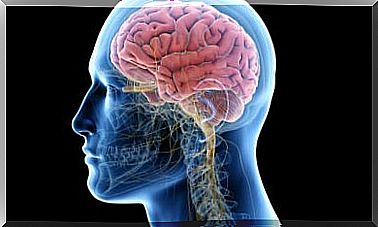The Pineal Gland, Every Day More Interesting
The pineal gland is a small endocrine gland found in your brain that produces melatonin. It is photosensitive and magnetoreceptor. Learn about its interesting functions in this article.
The pineal gland (pineal body, conarium or cerebral epiphysis) is a small endocrine gland, located near the center of the brain and whose shape is similar to a small pine cone.
Its functions include the production of me latonina, derived hormone serotonin. This fulfills the function of regulating the sleep patterns of each person.
Previously, the pineal gland was believed to be a simple residue from earlier phases of our evolution. It was not given greater importance, considering that it did not have important utilities in our current evolutionary phase.
However, recent reviews have raised more interest in this important gland. The results found have been linked to the issue of the ultradimensional.
As we mentioned earlier, today it is known that this gland is responsible for the secretion of melatonin, a hormone that decreases over the years and is related to circadian rhythms and the processes of puberty.
In addition, different findings have revealed that melatonin has an antioxidant action. It also participates in the apoptosis of cancer cells in the thymus (an organ of the immune system).
Pineal gland capabilities

This gland has the ability to respond to the variations of light that occur around us. That is, it is photosensitive. Therefore, it identifies when there is darkness around us to secrete melatonin. With this, he manages to induce us to a state of calm and introspection.
We know that the circulation of hormones through our body causes a series of emotions and sensations. These, in turn, vary according to the type of hormone secreted.
In the case of the pineal gland, humans secrete endorphins. These help us to enter a more intimate state of consciousness. This state is stimulated by the sense of tranquility that melatonin brings.
By releasing these endorphins, our body slows down and relaxes the senses. Thus, the reduction of glycogen in the blood gradually induces us to sleep and a state of tranquility.
In this state, brain activity is low. Likewise, interference from the outside world is reduced and concentration on oneself is increased.
This, on a practical level, makes us distance ourselves from problems and leads us to observe them from another perspective.
In this way we have a more reflective thinking and we take the time to review all the daily events.
Thus, we find answers and solutions that without that concentration it would be difficult for us to achieve.
On the other hand, recent research has determined that the pineal gland is a magnetoreceptor. That is, it is sensitive to magnetic fields and transforms their waves into neurochemical stimuli.
Electromagnetism, the pineal gland and public health

Professor José Luis Bardasano, from the University of Alcalá de Henares (Spain), gave a presentation entitled “Electromagnetism, pineal gland and public health”. He is one of the leading specialists on the subject of bioelectromagnetism.
In it he explained that in our body there are two communication systems. One is chemical based and the other electrical based .
- It refers to the endocrine system. System responsible for secreting hormones that travel through information channels. As for example, the blood vessels, lymphatic vessels or the neural canal, among others. This in order to reach the target or effector organs.
- It refers to the nervous system. In this system the signals are electromagnetic. Therefore, they are distributed through a network with centers and “substations” that sits on neurons. In this way they reach muscles, heart or glands, among others.
Both systems have evolved in parallel. Since their origins they work together in perfect chronobiological harmony.
Both the rhythms and the cycles in which they work are coordinated by the pineal gland.
These investigations have been able to determine that electromagnetic alterations can interrupt the secretion of melatonin. Like light does.
Reduced activity of the pineal gland can cause serious problems in the person, such as:
- Fatigue
- Stress
- Mood disorders
- Sleep disorders
- Low professional performance
- Depression
- Lack of concentration
- It also generates the risk of suffering from cancers such as breast cancer.

Interesting!
As you can see, the pineal gland is more interesting than was believed a few decades ago.
Their activity favors us both physically and emotionally, participating in our daily coping with stress and generally improving our quality of life.









